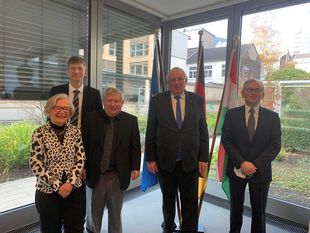This year’s World Diabetes Day on November 14th marked the 100th anniversary of the discovery of insulin by Frederick Banting and Charles Best. However, despite numerous other innovations in research, diabetes incidence is on the rise throughout the world. According to the International Diabetes Federation Atlas, the number of people with diabetes worldwide is currently close to 540 million. An increase to 784 million is forecast for 2045. According to the latest estimates, the numbers are also increasing in Germany with around 600,000 new cases per year. World Diabetes Day is therefore being used to draw attention to the resulting challenges for society.
For this reason, a press conference was held on November 12th at the Ministry of Health, Labor and Social Affairs of North Rhine-Westphalia with Health Minister Karl-Josef Laumann – together with Prof. Dr. Michael Roden, spokesman for the board and scientific executive director of the German Diabetes Center (DDZ), and Norbert Kuster, managing director of the North Rhine-Westphalia Regional Association of German Diabetes Aid, as well as Dr. Olaf Spörkel, head of the National Diabetes Information Center, and Dr. Jolanda Schottenfeld-Naor of the Diabetology Practice Düsseldorf. At the press conference, Professor Roden described diabetes as an epidemic and potentially fatal disease. "People with diabetes are at higher risk for a worse course of corona infection. Furthermore, there may be limited access to regular diabetes care during the pandemic," said Professor Roden, who is also head of the Department of Endocrinology and Diabetology at Düsseldorf University Hospital. However, he sees approaches to optimize care, for example through a stronger coupling of research and care and intensive interdisciplinary collaboration. As a concrete example, he mentioned the CARDDIAB research building, where in the future cardiology and diabetology research at Düsseldorf University Hospital will be take place in an interdisciplinary environment. "Nevertheless, there is also an urgent need for action for example due to the lack of university departments and specialists," said Professor Roden. "Since 2000 the number of chairs in diabetology has decreased from 17 to just seven today.”
In view of these reports, Health Minister Laumann announced that he would be advocating a binding timetable for a Germany-wide diabetes strategy at the Conference of Health Ministers. Until concrete measures are taken at the federal level, the DDZ, together with its partners and other institutions, will continue to try to raise public awareness of the issue and expand prevention services. The inhabitants of Düsseldorf were able to experience this live on World Diabetes Day: the DDZ, a partner of the German Center for Diabetes Research (DZD), organized a health market with a focus on diabetes on Burgplatz in cooperation with German Diabetes Aid. The highlight of the event was the visit of the governing mayor of the state capital, Dr. Stephan Keller, who together with the DDZ board pressed a red button to start an illumination: well-known institutions on the banks of the Rhine, such as the Tonhalle, the TV tower and the Ferris wheel, were then illuminated in blue. The action was part of the worldwide Blue Monument Challenge, which was intended to draw attention to the rising incidence of diabetes.

